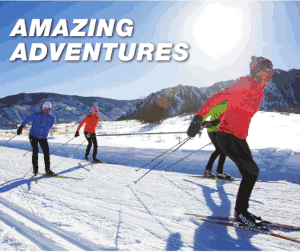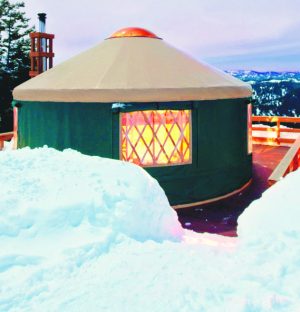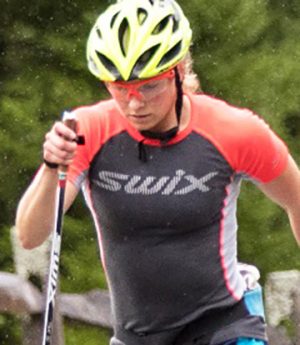November 18, 2015 (Canmore, AB) – Pierre Lafontaine will take over December 1 as Cross Country Canada’s (CCC) new Chief Executive Officer (CEO), the Board of Directors recently announced. Lafontaine previously served as CEO and national coach of Swimming Natation Canada from 2005-13, followed by two years as CEO of Canadian Interuniversity Sport. Prior to taking the reins of swimming in Canada, Lafontaine spent three years as head coach of the Australian Institute of Sport (AIS). Prior to that, he coached with a swimming club in Arizona.
Lafontaine explains here how coaching and managing accolades, mostly earned in swimming, are transferrable to cross-country skiing. He also talks about his upcoming move to Canmore (west of Calgary) from Ottawa. Lafontaine equally shares his vision for how he wants cross-country skiing to develop in Canada.Please tell us a little about Pierre Lafontaine i.e. your home town, alma mater and how you got into sports.
Pierre Lafontaine: My hometown is Beaconsfield, QC (just west of Montreal). My mother, father, sister, and brothers are still on the West Island of Montreal. My wife is really outdoor-oriented; she’s originally from Portland, OR, but we met in Calgary.
I started coaching at the Pointe Claire swimming pool in the 1970s with a program for disabled swimmers (i.e. Down’s syndrome) before moving to Calgary for another coaching job. In 1988, I moved to Arizona to work with the Phoenix Swim Club and relocated briefly to Atlanta Georgia for 1995-96. After 2000, I moved to Australia to take a job as assistant coach at the AIS, but within a few months they offered me the job of head coach.
At the 2004 Athens Games, Canada didn’t win a single medal in swimming. After that, Swimming Canada offered me a job. I said that I might take it if they made me head coach and CEO, to which Swim Canada said “yes.” I worked there from 2005-2013. After that I worked for CIS university program, but it was a bumpy road.
I celebrated my 59th birthday recently (Nov. 11) and have completed the 33km Gatineau Loppet. I am the father of two boys and two girls. My own kids got into biathlon for three years or so before moving into xc skiing at the Nakkertok Nordic. My 9-year-old did well there, but none of them grew up on snow. They’re all good swimmers as well.
CCC has gone through some tumultuous times over the past 12 months; what are the main challenges you face?
PL: Let me answer that with an anecdote; as I was leaving Australia in 2005, I was thinking about the Canadian swim team. What could I do to build on all the great things they already had in place? So I wrote down a list of 100 great things about the Canadian sports system. I figured when I got to Ottawa, I could start working on issues that were a risk to greatness. Yes, there were certain issues then, but also a lot of great things; most things in place were contributing to greatness. There were some questions of co-ordination.
So now I am in about the same position regarding cross-country skiing. Not everything is perfect, but we have some great clubs and coaches. I want to identify all the good things and then look at whatever road blocks there are. I want to create vision and get all the sticks out of the wheels. I want to work with coaches and volunteers. With them on board, the path will be straight ahead. I can’t change CCC (by myself), but together we can.
What plans do you have for the women’s program?
PF: That’s a very good question; I don’t know if we can turn things around quickly. I will have to discuss this with my staff. I want to know what the depth of the situation is. How far back are we? How quickly can we turn around? We are 27 months out from the next Winter Games in 2018 and 72 months from the 2022 Games. Our best performers are already in the pipeline (for both). Are programs justified for their ability? We (athletes, volunteers, clubs, coaches, CCC) need to work closely together; solo coaching is definitely not the way to go. We need to identify what we have and what we don’t have…
I saw a 48-page document listing our strategic plan, but I want to distill that down to one page of the four most important ingredients that we need to put in place. We need to do that quickly and with passion.
What about the development pipeline for both men and women?
PF: Looking at the 2012 London Games, most of the kids were already in the pipeline six years earlier; it takes at least that long to develop already talented kids into world class athletes.
We obviously need to look at what has and hasn’t been done. I hope to have discussions on this topic before Christmas. We need more emphasis on development. We need to work with the provincial bodies and hopefully avoid duplication of efforts. We need to look at the Quebec and Ontario Winter Games for instance. These kinds of competitions are stepping stones. Perhaps we can work with friendly competitors such as Finland and Norway, sending our best kids to Scandinavia for a month. I think this is possible.
My role is to ask questions and to make it happen. We need to invest in young coaches. We need to kick-start (their careers) internationally. And we need to build up our membership.
What will it take to win Olympic medals for Canadian XC skiers?
PF: There is no excuse. Part of the discussion with our coaches Justin [Wadsworth] and Louis [Bouchard] is looking at the next 27 months. My job is to find how to get it done. I think Canada should be in the top three internationally with XC skiing. Maybe it’s not a clean sport (and that’s also why we’re not at the top). What do we need to be great?
You’ve said there are similarities between Swimming and XC Skiing… please elaborate and how the benefits and successes are transferable.
PF: If cross-country skiing is anything like swimming, you have to be in the hunt (for medals) the year before. In both sports, technique is crucial, but you also need tremendous fitness. Of course there are similarities in commitment and workload needed. Both sports are club based with coaches to provide inspiration.
Because both sports are club-driven, what else can we do to help clubs? XC can be the no. #1 sport in Canada. (Lafontaine was not only talking about Olympic medal counts here, but also the number of Canadians participating in the sport). We need to learn how to build up that aspect of the infrastructure.
Can we get every Canadian on skis whether it is Nordic or Alpine? Can we get every Canadian to swim? We need to work with the schools to build tracks. There are many similarities that can blossom.
Performance creates idols and makes the news; it also has potential to double our membership. But there are other aspects to building the sport. When I’m skiing in Gatineau Park, I see 80-year-olds on skis. People can ski for life. How do we get new Canadians on skis? How do we develop the best coaches? If we do that, we can win more medals than in any other sport!
We want the 17-22 year old kids to love skiing so much they don’t, want to quit. Local programs provide inspiration but are we providing stimulating or boring programs? Part of keeping kids in programs longer (is making things interesting). Maybe they will even become coaches later.
Australia is a leader in the world of sports – is Canada able to benefit with your knowledge of their success?
PF: Australia is a country of sport; most of the population lives 15km from the ocean. Everyone knows how to swim there, but Australia has fewer drownings than Canada. My kids lived happily on the beach for many weekends. (With that lifestyle, many people) become tremendously athletic there. And these skills can be transferred between sports. Australia also provides a lot of support for athletic programs. And they have good training centres.
Looking at the CCC, we have training centres in Thunder Bay, Canmore, and Quebec City. Yes, there are a lot of reasons why the Australians are good, but we need to concentrate on our strengths. The parts are all there. We need to work better together with our coaches and athletes and train them to race at the top level. I would like Canadians to be known as “the toughest in the world”. We need to have a class act.
SkiTour Canada 2016 is a huge opportunity – we’d love to hear your comments and any plans you can share.
PF: Yes, it is very exciting. I will be looking at it a lot to try and use this as an opportunity to inspire up-and-coming kids. Magazines publish unbelievably (good) stuff; imagine a cool photo skiing in front of the Parliament Buildings. For local (Ottawa) Nordic clubs like Kanata, Nakkertok, Chelsea, this really can be something special. I want to CCC work better with the media.
We need to bring the world to Canada: if Alex Harvey, or others who race in Europe do well, they make the news for a day. But with events here in Canada, we can make the news in the days before and after the event. This can be inspiration for the nation and for 35 million Canadians; something to be proud of. The media is a great tool for our sport and XC skiing is something to make people proud of.
Let’s get it done. I believe that no other country can do it this well. Everyone in the world says how they enjoy events here. Canada is known for non-obtrusive hospitality while making guests feel at home.
Another anecdote from the world of swimming: there are three major open water races in Quebec – Lac Megantic, Lake Memphremagog and Lac St-Jean. Swimmers who come here say these are the best events in the history of the sport. They really appreciate coming here. Organizers created a “wow” factor that makes visitors excited about coming here. Maybe I will only be able to sleep two hours nightly, but I will try to make SkiTour Canada 2016 that good.
FIS wants to internationalize the sport and SkiTour Canada 2016 is part of this formula, but not everyone sees it that way… what are your thoughts on this debate?
PF: Anybody can stage a cycling, skiing or swimming event. We need a magical event; we want the world to know we are experts on skis. The six hour or so time difference between Canada and Europe could be an advantage for live streaming ski races during prime TV time in Europe.
We want to capture the magic of the Parliament Buildings in Ottawa or in Quebec City. Skiing on Mount Royal or in the Rocky Mountains is so cool. All this fabulous scenery is right next to very good skiing. We need to work with TV and look at new ways to see our sport. In World Cup rugby, they sometimes put cameras on the referee’s chest to get good new camera angles. Or with Formula 1 they put a camera in hole in the asphalt and you see the cars driving overhead. What can we do for skiing?
We need to find out how to make the tour way better and use TV to our advantage. Perhaps there is some way to see this through a different eye and have a different experience. Among the strategies I see is using the coaches as sounding boards.
What do you look forward to the most about the new job and about moving to Canmore…and most apprehensive?
PF: I’m really excited about the new job and want to remove roadblocks to coaching. I hope to get companies to sponsor the sport. We can make them so proud of xc skiing. I want to see the clubs grow as well; this will make me happy. I want to make XC the number #1 winter sport at the Olympics…this is what I wake up thinking about every day.
I am apprehensive about being away from my kids. I love having the kids in my life. Hopefully, I will be on this side of the country a lot as 70% of our skiers come from Ontario and Quebec. But that’s not sure thing though. I love being a dad.
Anything you’d like to add?
PF: Organic publications like SkiTrax are so crucial for inspiration for the country. In Australia, and in Oceania, rock climbing is huge. I would have eight different rock climbing magazines in my house: they were in the living room, the bathroom, the kitchen, the bedrooms etc.
Now I want to put a ski magazine on the desk of every XC skier. That way, they can read about their heroes. Magazines like SkiTrax are really great and could be crucial to changing the sport in this country. Pictures with articles help grow any sport. Our job is changing the world. I love to think that I can do it…working together is the way to make things happen and grow.






![National camp action [P]...](https://skitrax.com/wp-content/uploads/2019/08/Duluth-4-2019-08-08-at-10.46.51-AM-300x246.png)
![Matt Liebsch on the CXC Elite Team [P] CXC...](https://skitrax.com/wp-content/uploads/2019/08/Matt-Liebsch-CXC.2-525x700.4-300x267.jpg)
![Dan LaBlanc [P]...](https://skitrax.com/wp-content/uploads/2019/08/Dan-LaBlanc-img_1855.3.jpg)

![Pierre Lafontaine [P] CCC](http://skitrax.com/wp-content/uploads/2015/11/Pierre-Lafontaine-head-shot3-copy-2.jpg)